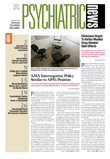With an M.B.A. degree under her belt, 24-year-old “Jaime” (not her real name) should have glowing job prospects in Chicago. But she harbors memories that erode her self-confidence and make her bristle with anger—memories of her father shouting at her, during drunken rages, that she was ugly and of little value.
Indeed, verbal abuse during childhood can scar people deeply, a new study suggests. It was headed by Martin Teicher, M.D., Ph.D., director of the Developmental Biopsychiatry Research Program at McLean Hospital, which is affiliated with Harvard Medical School. Results were published in the June American Journal of Psychiatry.
Although the injurious effects of child physical and sexual abuse have been the subject of considerable inquiry, not much attention has been paid to the possibly noxious effects of verbal abuse on children.
More than 500 young adults were recruited via advertisements to participate in the study. Each subject was evaluated for childhood exposure to verbal abuse, physical abuse, sexual abuse, and domestic violence. Each subject was also assessed for current anxiety, depression, anger-hostility, and symptoms of dissociation.
The researchers then looked to see if there were any associations between verbal abuse during childhood and current anxiety, depression, anger-hostility, and symptoms of dissociation; between other types of abuse during childhood and these current psychological problems; and how any associations for verbal abuse might compare with associations for other types of childhood abuse.
The strength of the association between maltreatment history and current psychological difficulties was determined by calculating the effect sizes and 95-percent confidence intervals for the differences between subjects who had no exposure to maltreatment and subjects exposed to the maltreatment categories. “Effect size is a more valuable measure for assessing the impact of an experience than the p value, which is strongly affected by group size,” Teicher and his coworkers explained in their report.
Childhood verbal abuse had a relatively weak association with current anxiety, the investigators found, but it had moderate to strong links with current depression, anger-hostility, and dissociative symptoms.
Moreover, these links were stronger than those for being a victim of physical abuse during childhood. They were comparable to those for witnessing domestic violence during childhood and for being sexually abused by a nonfamily member during childhood.
The only form of child abuse that had a stronger link with current depression and dissociative symptoms than childhood verbal abuse was being sexually abused by a family member. And even it had a weaker connection with current anger-hostility than did childhood verbal abuse.
These results, of course, do not prove that childhood verbal assaults can cause psychological consequences in early adulthood since the investigation was of a retrospective rather than a prospective nature. Nonetheless, Teicher and his coworkers believe that it may well be the case. As they concluded in their report, childhood verbal abuse is “a potent form of maltreatment.”
But perhaps the most interesting findings to emerge from their study came when they examined the links between more than one type of child abuse and current psychological difficulties.
They found, for example, an extraordinarily powerful link between the combination of verbal abuse and witnessing domestic violence and current dissociative symptoms. “This finding is consonant with studies that suggest that emotional abuse may be a more important precursor of dissociation than is sexual abuse,” Teicher and his team said.
Indeed, the connections that Teicher and his group found between various combinations of child abuse and current psychological difficulties were so potent that they often equaled or exceeded the link between familial sexual abuse during childhood and current mental health. “This is of great importance,” the researchers noted, “as it suggests that combined exposure to less blatant forms of abuse may be just as deleterious as the most egregious acts we confront.”
The study was funded by the National Institute of Mental Health and the National Institute on Drug Abuse.
